If there’s one word to describe the work of comic creator Jeff Smith, it is epic. The multiple award-winning author has become synonymous with stories that are expansive in scope; Bone was a fantasy quest on a massive scale, while Rasl explored the equal enormity of science fiction and parallel worlds.
Of course, in the modern age of comics, films, and television, we are no strangers to the epic. The massive maxi-series events, multiple-franchise crossover films, and intricate season-long arcs that populate these media are all symptoms of something – an innate desire to see ourselves (and therefore our protagonists) as being part of something larger. We want context. We want meaning. What makes Smith so unique in an epic-saturated cultural landscape is how he is quietly redefining the nature of “epicness”.
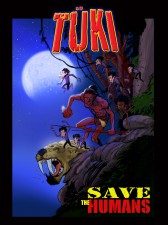 His latest ongoing comic, Tüki, takes place approximately two million years ago and follows the titular character as he unknowingly becomes the first human to leave Africa.
His latest ongoing comic, Tüki, takes place approximately two million years ago and follows the titular character as he unknowingly becomes the first human to leave Africa.
“He doesn’t know he’s in an epic,” says Smith, “He’s only concerned with the immediate problems of survival.” This perfectly sums up Smith’s redefinition of the genre: replacing the loud, frenetic energy of the modern epic with something considerably more introspective.
The opening frame of Tüki says it all: behind a mountain, the sun rises, slowly illuminating the expansive forested valley below. A couple of smaller panels show Tüki’s rocky path as he moves in the sunrise. That’s it. No dialogue. No captions. No words.
In fact, the first non-onomatopoeic words don’t appear until the seventh page of the comic. But they aren’t missed; rather than provide detail on an intellectual level, Smith fills each panel with the expansiveness of the environment.
“That’s the way comics worked back in the heyday of Sunday strips,” Smith explains. “I happened to be visiting The Billy Ireland Cartoon Museum & Library here in Columbus, and they had a Hal Foster Sunday page sitting out on a table. The emphasis of the page was on a large battle scene with Prince Valiant defending the castle.
“The artwork was arresting; the line work, the poses, the action tableau – it was a drawing you wanted to spend time with. And it had to be, because it was all you’d get until next Sunday! Focusing on drawing as part of the spectacle was perfect for a new serialized comic about a stone-age man wandering the vast landscapes of Africa.”
The result of this shift of focus is a very different reading experience; one predicated on feeling as opposed to thinking. It’s a move that makes a lot of sense when one considers how far removed we are from the world of Tüki.
That sense of feeling the story is rooted in Jeff Smith’s conception of the comic itself, which was inspired by a visit he made to Olduvai Gorge in Tanzania. The site is notable for the geographical convergence of various species of hominid over millions of years, as well as evidence of stone tools and community interaction: two key phases of our species’ evolutionary journey.
“I remember standing looking at the fossils on display, and then, standing there, in the dust, under the same sun where so many of our earliest ancestors stood, everything seemed so real. I could imagine them walking about, living their lives.”
Elements of the quotidian existence of our predecessors are woven throughout the comic. “The things that he ate, what tools he used, all that helps bring Tüki to life. And it makes it interesting for me!”
The pursuit of food is central to the comic. Throughout the early pages, Tüki attempts to hunt, seeks out increasingly scarce sources of water, and pursues a evasive monkey orange, all of which are based on the extensive pool of anthropological research from which Smith pulls.
It is the promise of food that leads to an unconventional encounter with a different “two-foot” – one of several species similar to our own that co-existed briefly in the time period of the comic. As Smith explains, “One of the reasons I set the story two million years ago was because it was a crazy period when multiple species of early humans lived at the same time.” The meeting between the two kicks off the first actual exchange of dialogue in the entire comic, and begins the narrative journey of Tüki venturing beyond his native valley.
The exchange gets a boost from a little bit of magic – a slightly hallucinatory experience that allows the two to speak the same language. It’s a defining moment for the book, a moment where Jeff Smith’s primal sense of history at the Olduvai Gorge blends with the considerable research he conducted on the era. “This is a story with comedy, adventure, and some elements of fantasy, but it takes place in an impossibly far-off epoch, and it helps to ground him in as much factual reality as possible.”
“As possible” are the key words here.
While there is a mountain of factual information on the various hominids of two million years ago, there is an even larger mountain of things we do not yet know. For every discovery, every answer, there are a multitude of questions. The field of anthropology, therefore, is as much about the hard facts as it is about the logical conclusions we can draw from them.
In Tüki, Jeff Smith channels the very best of anthropology in much the same way, staying true to the things we know as fact while indulging the wonder and intrigue of science fiction through the more fantastical elements of the book.
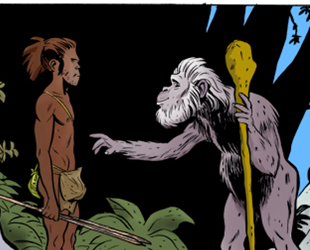 It’s a delicate balance to strike, but Smith is careful not to boast about his research. The monkey orange is in there, as we know it would have been, based on scientific evidence. However, in the context of the story it is just another source of food. It is for us as it would have been to Tüki – part of the quotidian existence of early humans.
It’s a delicate balance to strike, but Smith is careful not to boast about his research. The monkey orange is in there, as we know it would have been, based on scientific evidence. However, in the context of the story it is just another source of food. It is for us as it would have been to Tüki – part of the quotidian existence of early humans.
As the comic heads into its second season, Tüki’s world feels as though it is about to get much larger. On future developments for the series, Smith was understandably reluctant to say much, but he did give some indication of the anthropological developments readers can expect.
“Australopithecines, Homo habilis, and Homo erectus overlapped momentarily,” explains Smith. “They are part of the story, and yes, we meet more of them in Tüki Season 2. Some are maybe my favourite characters…”
Tüki is undoubtedly an epic, but not as we are accustomed to them. It presents us with a quieter, humbler version of heroism – one in which the hero is unaware of the significance of his actions.
Instead, we see the courage of living a life filled with uncertainty, of waking up to a world too big to traverse and too wild to conquer. Jeff Smith’s skill is in his ability to evoke the sweeping, epic nature of the world – and of Tüki’s role within it – without explaining it.
The Smith brand of epic is one in which the reader processes the story by feel – an emotive style that perfectly suits the story of all of us.
Tüki’s first season will be available in print as Tüki #1 in July 2014. Season Two begins soon online at the Cartoon Books website.





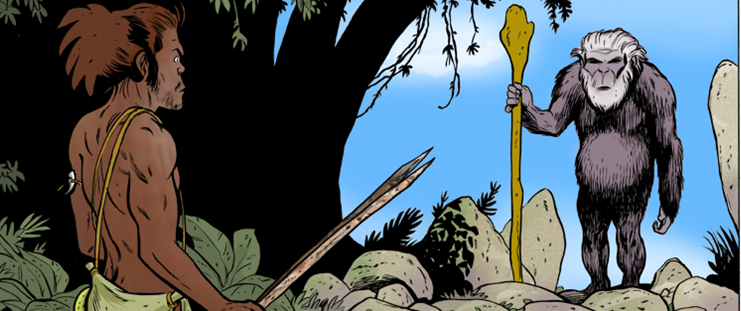

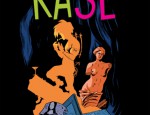

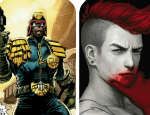

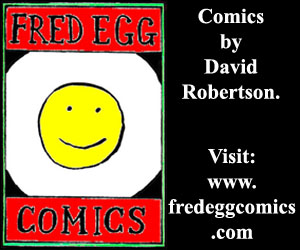





This will surely be another epic I would love to read! BONE was awesome (I want new stories!!) and RASL was cool… now TUKI please!!!